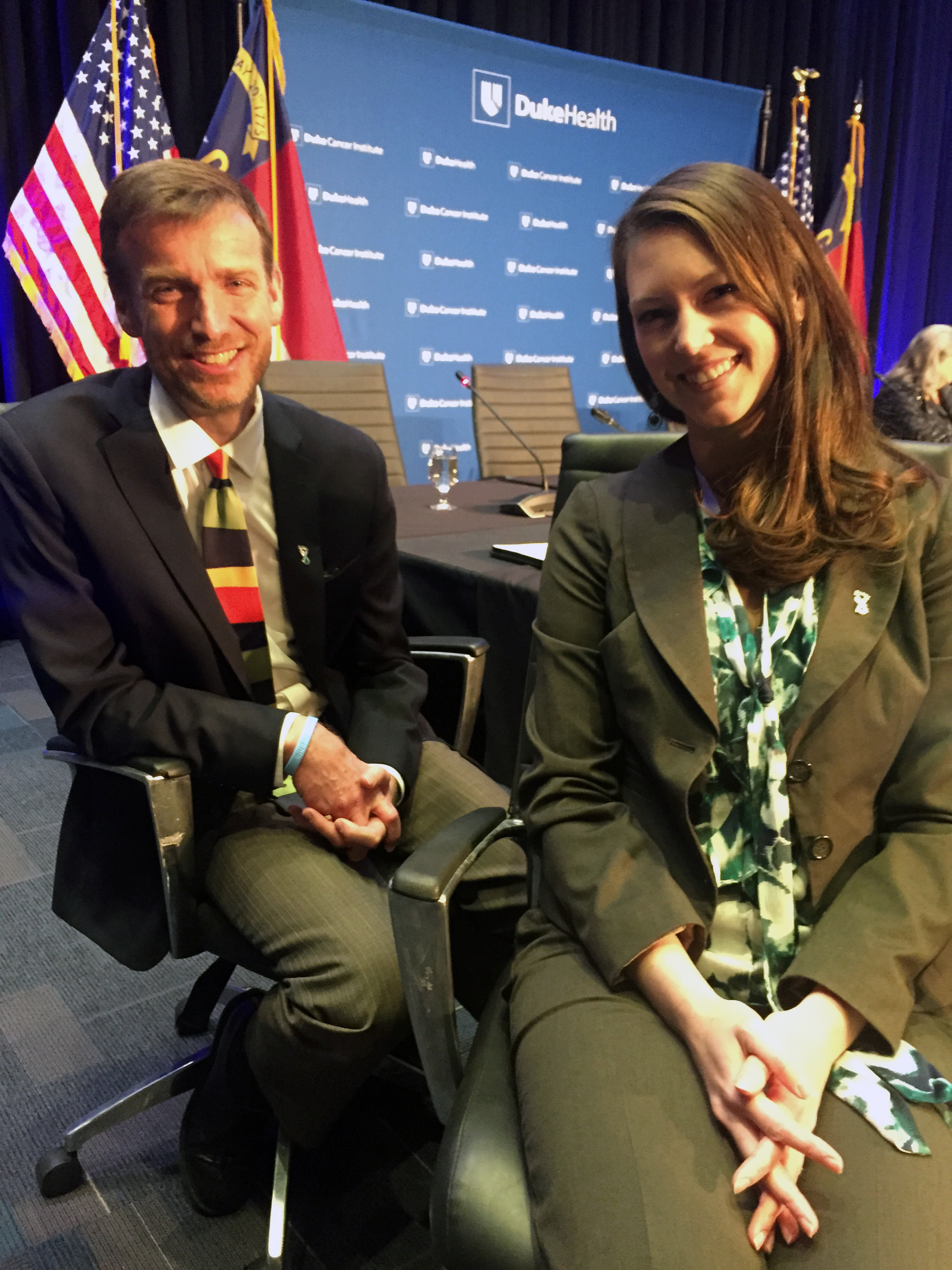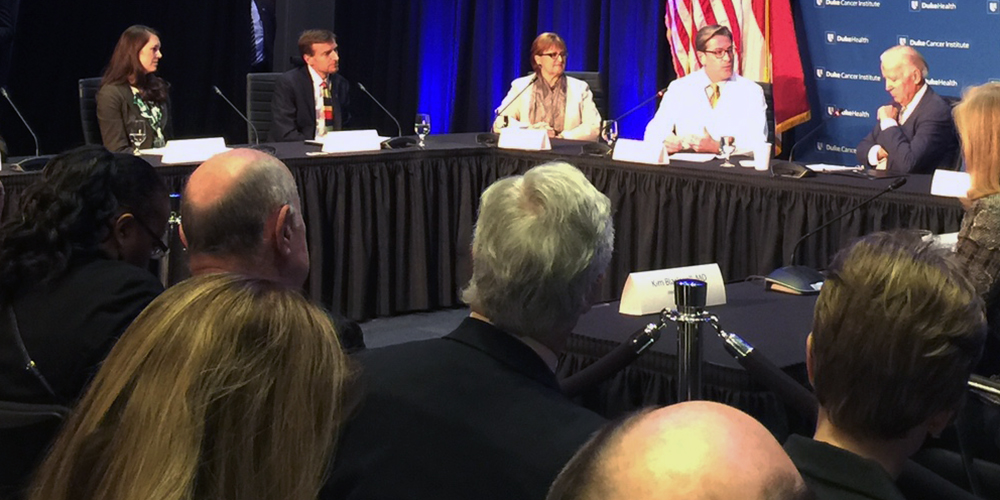As part of the “Cancer Moonshot” federal initiative to spur breakthroughs in cancer research, Biden hosted a roundtable discussion on Wednesday at the Duke University School of Medicine that featured cancer experts and leaders from UNC. Among the experts chosen for the panel were Stephanie Wheeler, PhD, UNC Lineberger member and assistant professor of health policy and management at the UNC Gillings School of Global Public Health and Niklaus Steiner, UNC-Chapel Hill professor and co-founder of the Chapel Hill-based Be Loud! Sophie Foundation, which supports adolescents and young adults with cancer.


Vice President Joe Biden made a stop in North Carolina to discuss the latest in cancer research and treatment with some of the people who know it best.
As part of the “Cancer Moonshot” federal initiative to spur breakthroughs in cancer research, Biden hosted a roundtable discussion on Wednesday at the Duke University School of Medicine with experts from UNC Lineberger and Duke.
“The vice president is gathering input from the right people on how deal with every aspect of the problem, and UNC Lineberger is proud to be a part of that effort,” said Chad Ellis, PhD, UNC Lineberger’s associate director. “There’s the idea that cancer is a single entity, and we can attack it with a silver bullet. I think this initiative will raise the notion that cancer is complex, and the complexity needs to be dealt with accordingly. It’s not just a pill or injection, it’s prevention, it’s behavioral interventions, it’s tons of screening, it’s a variety of distinct therapies than how we’re approaching it now, it’s a full understanding of the complex biology.”
Biden was recently appointed by President Barack Obama to lead the “Cancer Moonshot” initiative to lead government efforts in finding cures to cancer. His visit follows a White House announcement that a $1 billion jump start will be used to ensure the most promising work has the funding it needs. The initiative aims to bring about a decade’s worth of advances in five years.
“This is an incredible time for the cancer community, and it is important that we remind the vice president that we are committed to working together to shepherd his initiative forward,” said Norman E. Sharpless, MD, UNC Lineberger Comprehensive Cancer Center director and Wellcome Distinguished Professor of Cancer Research, Departments of Medicine and Genetics.
During his visit on Wednesday, Biden delivered personal remarks and then discussed topics with the expert panel of researchers, including from UNC Lineberger. Experts discussed the latest in cancer treatment and research, including genomics, targeted therapies, the importance of clinical trials, and the use of big data in cancer treatment.
Among the experts chosen for the panel were Stephanie Wheeler, PhD, UNC Lineberger member and assistant professor of health policy and management at the UNC Gillings School of Global Public Health and Niklaus Steiner, UNC-Chapel Hill professor and co-founder of the Chapel Hill-based Be Loud! Sophie Foundation, which supports adolescents and young adults with cancer.
Wheeler spoke to the panel about the importance of early detection and early diagnosis, racial and geographic cancer disparities and UNC Lineberger’s Integrated Cancer Information Surveillance System (ICISS). ICISS is a powerful, data-rich research tool that links multiple population information, as well as clinical and other data sources. It contains details on all North Carolina’s cancer cases, as well as links to health claims data for 5.5 million insured people– covering about 85 percent of North Carolina’s cancer patient population. No similar integrated population-based cancer informatics system exists in the United States.
“I think that the question that you’re asking about getting drugs to the right people – there’s a step before that, and that is early detection and early diagnosis,” Wheeler said, in response to a question posed by Biden about how to open up clinical trials to a broader patient population.
She said that while researchers have developed early cancer detection strategies that work, they’re being underutilized by the poor and by people in rural areas. At UNC, Wheeler said researchers are continuing to use big data systems to get information on cancer care across the state to try to close some of those gaps.
Steiner spoke about the foundation’s effort to raised funds for a position at UNC Hospitals that’s focused on helping help adolescents with cancer. The foundation was launched in memory of Steiner’s daughter, Sophie, who was diagnosed with cancer at UNC at age 14.
“She got the best possible care,” Steiner said as part of the panel. “The doctors there did exactly what you asked them to do — they broke down silos. They sent samples around the country and the world. But it just wasn’t enough.”
Soon after her passing, Steiner and his family formed the charitable organization to support teen cancer patients and their families at UNC Hospitals.
Steiner spoke to the need for resources in tailored care for adolescent and young adult patients — those ages 13 to 26 that the National Cancer Institute has referred to as a “no man’s land.” To address the specific psychosocial needs of this age group, UNC Lineberger created a unique liaison role at the N.C. Cancer Hospital dedicated to designing support programs and providing resources to this demographic.
The nation’s first Adolescent and Young Adult Liaison started in the position this fall.
“Let me just say to you and your wife, I think what your’e doing is wonderful,” Biden said.
*Panel begins around minute 41
